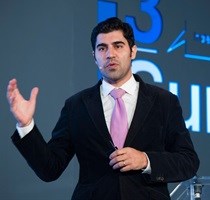
The agenda featured acclaimed political and business leaders from South Africa and across the globe, which included Dr Parag Khanna, leading geo-strategist and author.
"I come here as an optimist in terms of emerging markets," said Dr Parag Khanna at the i3 Summit.
But with some of the BRICS countries' economies turned to rubble, not all emerging economies are equal. According to Khanna, we are approaching the peak of oil demand, which is bad news for Brazil and Russia. Brazil is being threatened by a looming recession and rising unemployment, and Russia is in a deep recession. Where does South Africa stand and what lessons can we learn from successful emerging markets?
It's 25 years since the end of the Cold War. In 1994 the US was leading the economic and political world, supported by its developed market allies, the EU and Japan, as well as by accelerating China and India. But this old world order of the 'Big Five' has gradually made way for the new geopolitical marketplace wherein every continent matters. 'Despite the US's stupendous military capability, it cannot always get what it wants,' observes Khanna. There is no longer one single power calling the shots.
Globalisation has spawned a new geopolitical marketplace. A super-economy, such as China, needs raw materials from across the globe and has expanded its supply chain tentacles across continents. That has driven up growth rates across Latin America and Africa, particularly during the 1990s and the previous decade. Everyone benefits from globalisation, for example in the form of energy abundance (oil and gas) now coming from several sources across the world. The investment in inter-continental connectivity has created a new world where every continent matters.
Despite its recent slowdown, China is still growing at 7% on a $18 trillion GDP. Its current account surplus is around $450 million and it is reducing excess capacity but not consumption. Its e-commerce sector is surging, with growth around 400% per annum!
Khanna calls the problems currently facing India the 'storm before the calm.' Its growth has surpassed that of China. It is politically stable, Modi is 'cleaning the house', inflation is under control and the current account deficit has been reduced. It is receiving large sums of capital inflows, of which a significant portion is spent on rail development and establishing new cities.
In terms of growth, the demographics are on Asia's side, with it currently being the 'Centre of Gravity' in terms of world population. But demographic growth alone is not enough to drive economic growth; it has to be accompanied by connectivity, reminds Khanna.
Learning from its ancient silk route, Asia has established a network of iron roads to connect suppliers with markets. China's rail strategy has been intimate to its fiscal stimulus programme. And despite anti-Chinese sentiment, the Eastern two-thirds of Eurasia is slowly knitting together, similarly to the EU's rail and other major infrastructure investments. India is largely excluded, though, because of the Himalayas and its poor relations with Pakistan.
It is not a question of whether we should side with BRICS or the US or the EU. This is a world in which South Africa should multi-align with as many partners as possible. Having an investment agreement in place with the US, an aid agreement with Europe and a preferential export agreement with China, for example, will make us much more resilient than partnering with one country only. This is the age of multi-lateral agreements.
Nobel Prize winner Michael Spence recommends that developing countries allocate at least 8% of their annual budget to gross capital formation, that is, the connectivity components of transport, energy, water, utilities and telecoms. Khanna agrees and points out, 'What Africa needs are iron and steel lines instead of political borders. Fixed capital formation empowers the population, creates jobs, enhances social mobility and advances business models.'
Since the Great Financial Crisis, we've seen great resilience among workers in southern China, because they are able to move around. Khanna says, 'In SA, where you have 5 or 6 large cities, you want them all to be connected physically efficiently -either via rail, road or airlines. That allows the dynamism of the people to be unleashed.'
Being a megacity is not necessarily a good thing. There are teeming megacities with very poor infrastructure, such as Mumbai and Jakarta. Khanna observes, 'The greater Pretoria-Johannesburg cluster is becoming a megacity. I see a lot of investment going on here in terms of infrastructure capacity and I think the inherited base is solid. But with this growing population and high unemployment, you have to do a lot more to create jobs and to give more credit to businesses.'